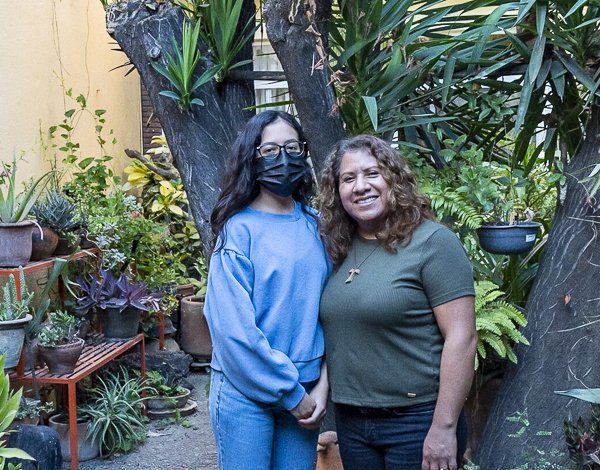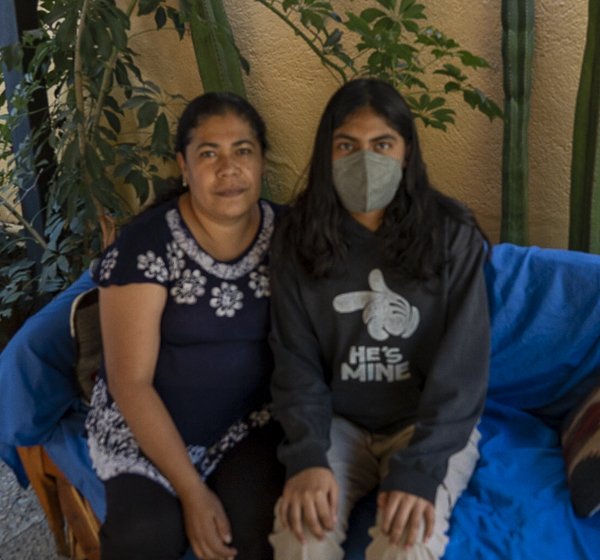The young women of Oaxaca
What do the young women students of the Oaxaca Learning Center want for their futures? And how has their life changed compared to that of their mothers? To celebrate International Women’s Day 2022, we talked to 4 students and 2 of their mothers. Of course this is in no way a representative sample - the Center has worked with over 3,000 students and usually has over 200 enrolled at any time. Some arrive timid and lacking in self-confidence, and may have little support from their families. Others have families who have sacrificed a lot to secure their children's futures and are working hard to help them succeed.
In a future post, we'll look in detail at how the Center works to build students' confidence - particularly of those who arrive thinking this is just like school. (Spoiler alert, it's really not at all like school!)
What was inspiring about these four young women we talked to, was how determined and hard working they all were. They were all planning careers, working hard on their goals for the future and felt that there was no lack of options open for them.
From left to right: Amalinalli, Karen and Cleotilde, Adriel and Aylen
“Women can do anything”
These young women had a wonderful 'can do' attitude and were working hard to find and pursue careers that they would love. Aylen (14) is in her last year of 'secundaria' and wants to study community medicine; Amalinalli (17) is studying human resources at the moment but plans to go to university to study architecture; Abril (14) is in the third grade of 'secundaria' and wants to study forensic medicine whilst Karen (14), also in the second grade of 'secundaria', doesn’t want to talk about too much about her plan just yet, though she definitely has one!
None of them felt that gender has influenced or limited their career ambitions.
“From my point of view, I think it’s the same for women as for men, because no school will say to you ‘No, because you’re a woman you can’t come here, or because you’re a man, you can’t come here.” Now there is equality between sexes, so a woman can have a career which used to be for men, like civil engineer perhaps. And men can be nurses, I don’t know, any job which used to be for women. People can do what they want.” Amalinalli.
Abril sounded a more cautious note. “Maybe men are physically stronger, but women can always try to do the same things. But I don’t think we’re completely equal, …because society still judges us before knowing us and believes that men have the right to do more things.” Abril (14)
Karen (14) was thoughtful when asked whether there are some jobs that are harder for women to do. “Maybe there are some things which are more difficult for women” she said. “But women are very capable, they can do anything. They can decide and they can do it themselves. They don’t need anyone. We come into the world alone and we are alone. BUT, everyone needs someone to give them help from time to time. Maybe there's something you can't do for yourself and then you need help from others.”
Looking to the future, they all assume that in ten years time they will still be studying, learning and developing themselves.
Karen wants to learn Hebrew. “It’s as if it were one of the languages here in Mexico, which now aren’t spoken so much. I like it - though it’s a bit difficult! I like it because I’ve always wanted to learn more languages, how to express myself in different languages. I used to know a bit of Mixe, I was taught, but I’ve forgotten now. …… In ten years I hope I’ll be a well rounded person, successful. That I’ll have learned how to value things. Perhaps I won’t have travelled the world, but I’ll know what I want to do with my life.”
Abril (14) thinks she’ll still be studying in ten years time, trying to improve herself to be able to finish her studies well. And Aylen has a dream of going to France and so hopes to learn French at some stage soon.
“We make a lot of effort so that she can learn as much as possible”
One message that came through very strongly was how hard the parents, particularly the mothers, have had to work since they were young to support themselves and their families and to ensure that their children - both girls and boys - can move ahead.
Adriel [Aylen's mom] wanted to study medicine, but her ambition was quickly quashed by the need to look after first her grandmother and then her mother.
“I started working very young. At her [Aylen's] age I’d already worked in many different places: I’d looked after a shop, looked after children, washed dishes, cleaned. And I say to her that now that that helps me, because nothing seems impossible, I’ll always find some work. But I don’t want to see her [Aylen] washing clothes…… I want her to make the effort to advance, to be better than us. I’m really proud that she knows things that I don’t. And I always encourage her, because I say we didn’t all have that opportunity and not everyone now has that opportunity.”
Cleotilde (Karen’s mum) reflected how much things had changed since her childhood.
“At this time, women are totally different. I’m thinking about my mum when I was little girl, she had to work a lot and my father always told her what to do. Very macho man.
And today, now I’m married, my husband is very nice. He helps a lot in the house. He works, he helps with the family, he’s a good father. And as a woman I’ve been able to do a lot of stuff in my life. I work, I sell cakes, I sell perfumes, I sell shoes. I can speak English, I do karate, I like to swim. I think women can do a lot.”
Despite their hard work, all the parents we spoke to still face considerable economic challenges and are very conscious that the public school system really limits their children’s chances. Extra support, such as that from the Center, is critical for them.
“This is what I was looking for”
“I am always looking for good people who can help my son and daughter. I was praying for a long time until I found this Center and I said ‘oh my goodness, this is what I was looking for”” (Cleotilde mother of Karen)
The pandemic brought this into even sharper focus. Amalinalli says that before the pandemic she was getting on much better at school, but that she’s been struggling since then. “In public schools, the teachers aren’t paid very well, so they don’t have very good resources themselves. They may be struggling with their internet connection, they don’t explain anything to you, just send you the homework tasks.”
Cleotilde: “It was very difficult being inside all the time. Spending more time with your partner, becoming Karen’s teacher, trying to help my other child with his homework. We didn’t have mobiles, didn’t have internet, nor even a computer. So we had to work really hard to be able to get a phone for her.”
Thanks to donations to the Learning Center, they've been able to provide internet recharges and loans of phones or computers to various students and these have been a lifeline for many families. “The Center has always supported me” says Karen, “because we don’t have much money, and so I really appreciate them and their supporters and how they’ve taken me into consideration when providing internet recharges."
All of them spoke enthusiastically about the broad educational support they've received from the Center.
"It’s very complete, very holistic. It’s helped me become a better person, to talk about gender, discrimination, to be respectful to older people, teachers etc. And it’s helped me to appreciate, value everything that you’re offered. And to give the best of yourself - if someone’s offering you an opportunity, then you make the most of it.” Karen.
All the women we spoke to had such energy and determination - and they all work incredibly hard. It will be exciting to see how these young women's careers develop. Hopefully they'll grant us another interview in 10 years time!
Many thanks to:
Aylen Jiménez Córtes and her mother Adriel Jiménez Bautista
Karen Cordero and her mother Cleotilde Márquez Hernández
Abril Medinilla Morales
Amalinalli Odilón Delgado
Based on interviews with Sylvia Hines (Communications Officer, FOLC) and Viviana Ruiz (Board member, FOLC)



